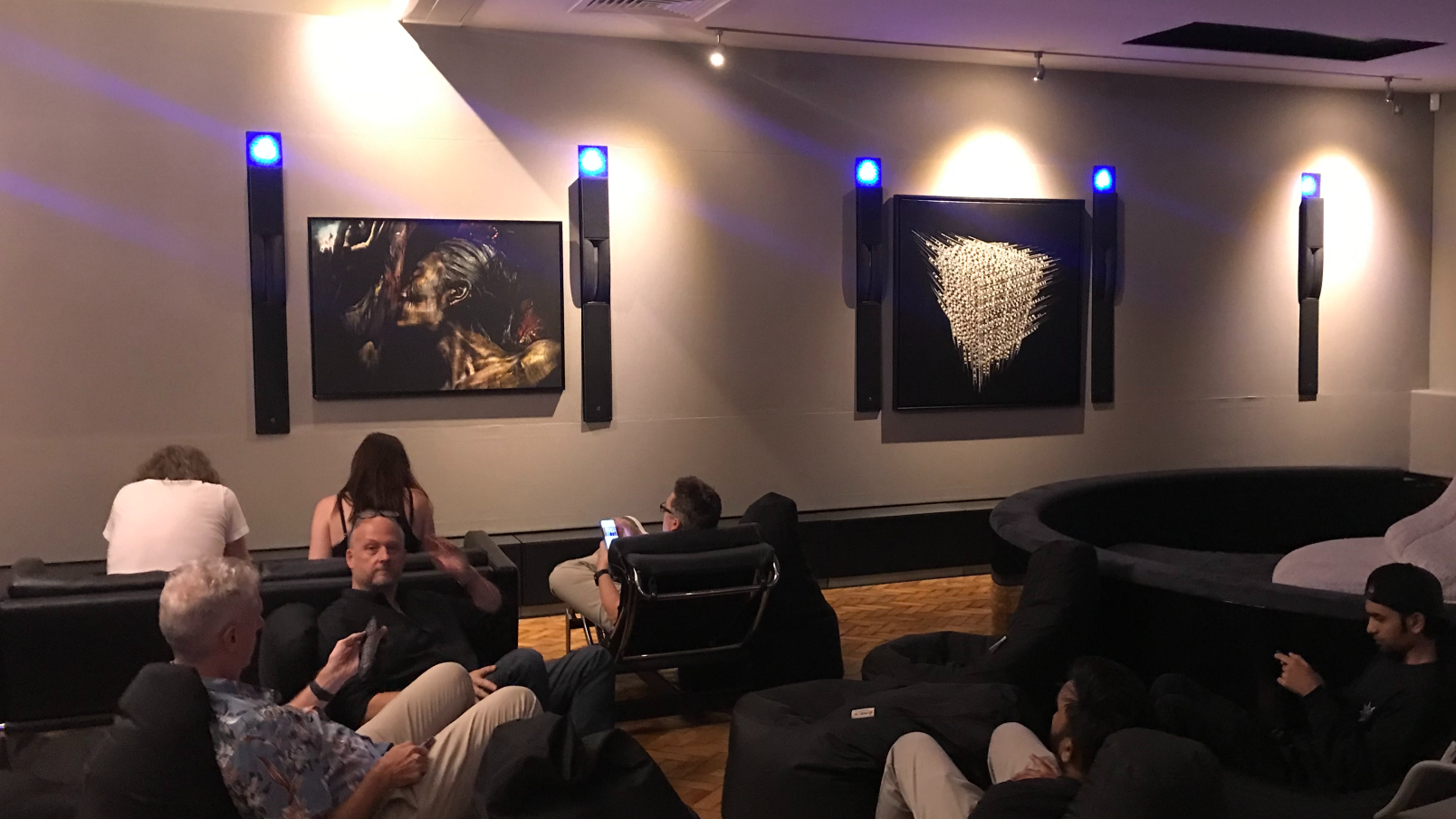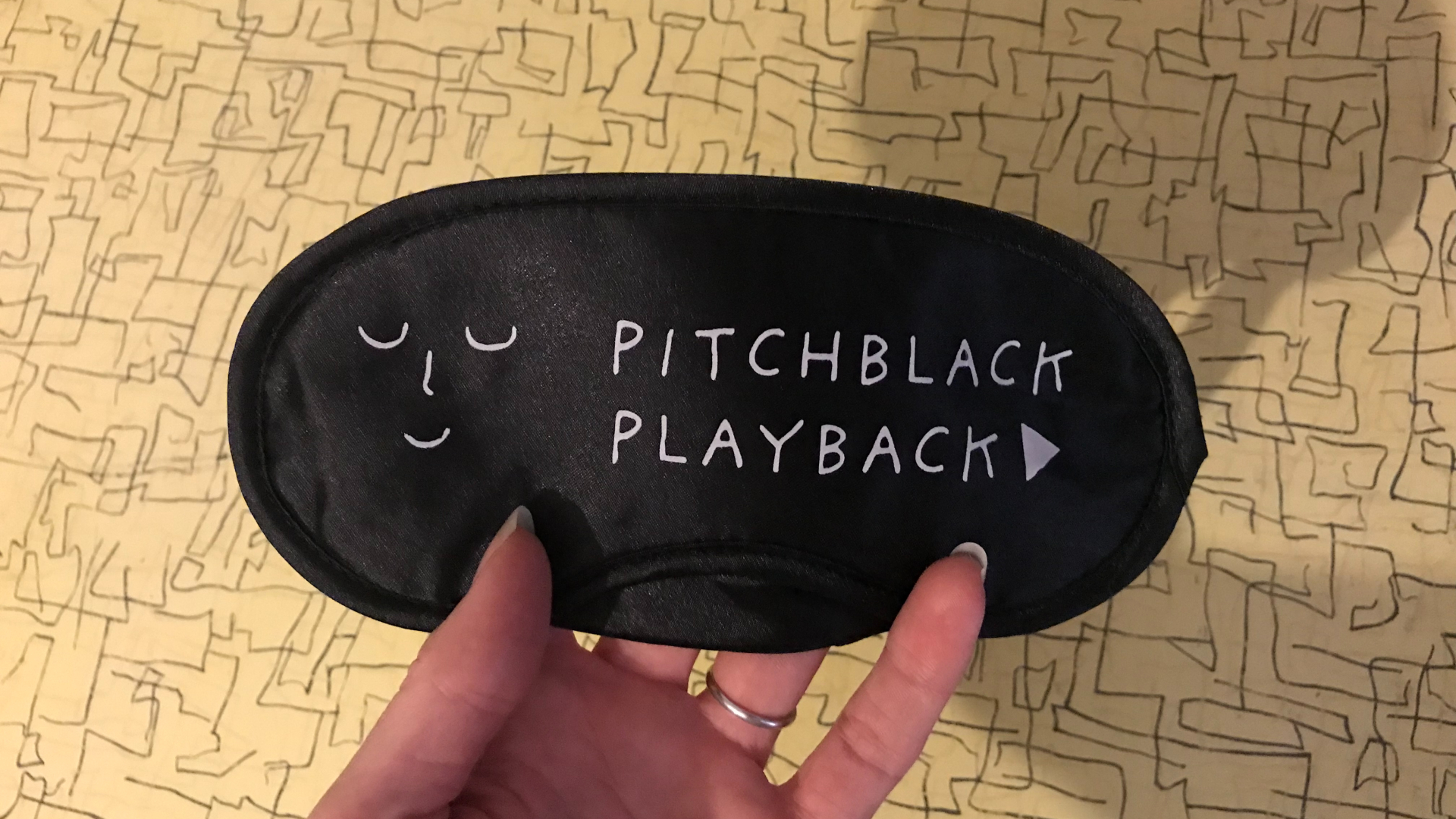This 18.1.12 sound system is like Dolby Atmos on steroids, and it blew my mind
Never been to L-Acoustics in Highgate, London? Go. Go soon!

Sign up for breaking news, reviews, opinion, top tech deals, and more.
You are now subscribed
Your newsletter sign-up was successful
Walk in, select a bean bag, get comfy, then place your Pitchblack Playback blindfold over your eyes (don't try to put the blindfold on first, it's far trickier that way). Now, get ready to be whisked away from this dimension on a sometimes pensive, sometimes wild progressive rock ride.
I've been a fan of L-Acoustics for years. The company makes some of the best stereo speakers and outrageously good high-end party speakers for the discerning listener out there. You know line-arrays: the huge banana-like black speaker arrays you see suspended at gigs? That's an L-Acoustics innovation.
I've even been to a Pitchblack Playback session hosted by the company before, of Daniel Avery and Alessandro Cortini's Illusion of Time. Since then, however, L-Acoustics has integrated 12 (yes, 12) of its miniature coaxial Sky speakers overhead to enable Dolby Atmos support, the likes of which you've never heard before.
To put what L-Acoustics is doing with Atmos into context, most traditional Dolby Atmos home theater systems feature a 5.1.4 configuration. This involves a central channel speaker in front of the listener, two either side of that but further out, and two behind the listener (all angled in to face the 'sweet-spot'), plus a subwoofer, and four overheard speakers.
L-Acoustics' Ocean showroom in Highgate, London, is a majestic 18.1.12 system, comprising 18 of the company's celebrated Syva speakers, no fewer than 25 subs holding down the low end and 12 overheads. It's a total of 45 talented speakers, and up to 55,000 watts of power.
We're listening to Porcupine Tree's latest album, CLOSURE/CONTINUATION on this incredibly immersive and talented system, and what is so exciting about it is that L-Acoustics worked directly with Steven Wilson on translating the Atmos mix to this room for a perfect playback.
And what's exciting about that is that in addition to fronting the band, Steven has become the go-to mixer for revisiting classic back catalog in Atmos and spatial audio. He has been entrusted with Tears for Fears, XTC, Kiss, Jethro Tull, Black Sabbath, A-Ha with many more to come and garnered six Grammy nominations. Not bad.
Sign up for breaking news, reviews, opinion, top tech deals, and more.
Opinion: this is immersive but tastefully done Atmos at its most otherworldly best

The lights in the Ocean showroom are turned off completely for these events, but putting on the blindfold anyway is strongly encouraged, the theory being that deliberately cutting off one sense heightens the others. I believe it is essential to enjoy this system at its fullest.
Sitting in complete darkness and silence (all attendees this evening were prompt, because late entry is not possible), vocals slowly build like mists, occasionally swirling, sometimes more of an ambient backdrop – but never upfront and central, as voices often are in mainstream music. Steven Wilson uses his vocal as a useful addition, rather than the focal point.
A beat gently walks around my head. It must have been tempting to do more – to add gimmicky crescendos or ping sounds around our skulls like fireflies dancing, but this is more meaningful. Don't get me wrong though, it's still a wild and powerful ride.
Sounds occasionally approach from closer to your shoulders and saunter up the back of your neck; it is pure sonic theater. I might even have whacked the volume up a little higher to hear what this prog-rock romp sounded like at something closer to full whack, but I appreciate that my proggy inclinations may not be shared by all.
If you love music and want a new experience in immersive audio (but I mean immersive audio after a triple espresso), I urge you to find a Pitchblack Playback event near you and go along. And if you're a Londoner who wants to check out L-Acoustics, the company is just getting back into the swing of hosting regular evening listening sessions, so keep your ear to the ground on that too. You will not be disappointed.

Becky became Audio Editor at TechRadar in 2024, but joined the team in 2022 as Senior Staff Writer, focusing on all things hi-fi. Before this, she spent three years at What Hi-Fi? testing and reviewing everything from wallet-friendly wireless earbuds to huge high-end sound systems. Prior to gaining her MA in Journalism in 2018, Becky freelanced as an arts critic alongside a 22-year career as a professional dancer and aerialist – any love of dance starts with a love of music. Becky has previously contributed to Stuff, FourFourTwo and The Stage. When not writing, she can still be found throwing shapes in a dance studio, these days with varying degrees of success.